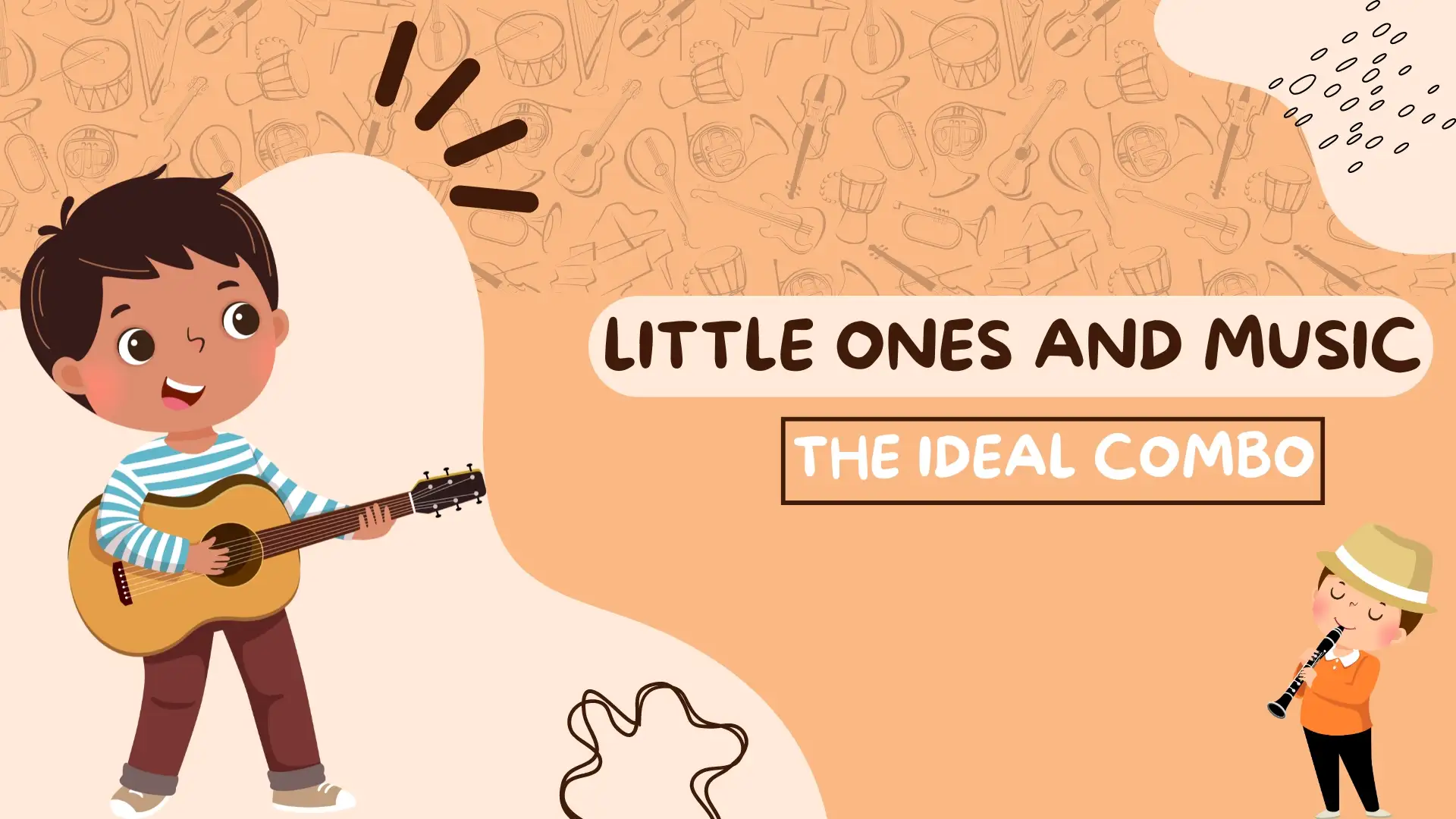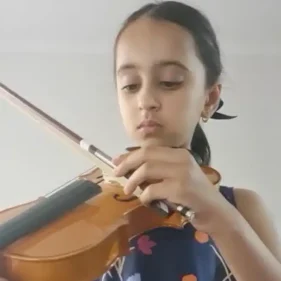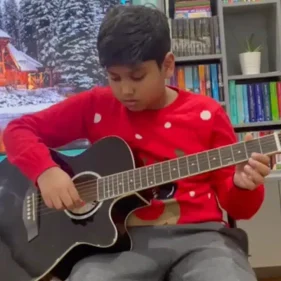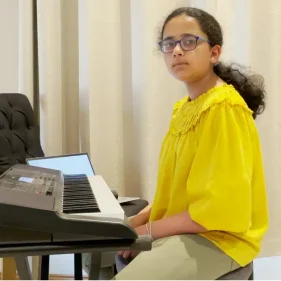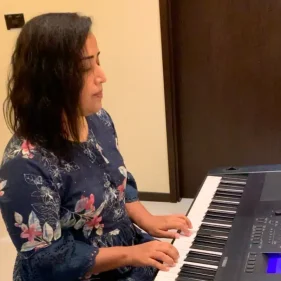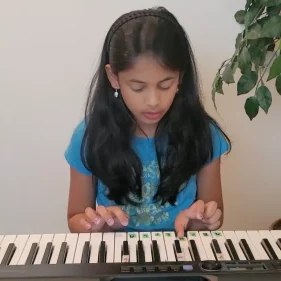Music for babies is a dedicated playlist in youtube, spotify and other audio streaming platforms. Why is is picking up traction? Lets see!
It is said that music is the language of emotions because it has the power to evoke a wide range of feelings and sentiments within us. But other than this music can have a significant impact on us humans. For example, it enhances cognitive abilities and helps us uniquely understand the world around us.
What does Music do?
It improves memory and concentration as well as fosters creativity and promotes social interaction. Therefore, the benefits of music education are vast. Especially, music for babies and young children whose minds are like sponges that soak in new experiences and knowledge. Introducing music to babies at an early age can lay a solid foundation for their overall development.

Music is deeply ingrained in childhood nurturing hearts with its melodies and harmonies creating a symphony of joy and growth.
To help you introduce music to your child, we have explored different ways. In this article, we will delve deeper into how you can make music seem more interesting to your baby or toddler.
How to introduce music to babies?
- Keep music playing regularly: To introduce music to your child, keep gentle and calming music playing regularly in your home. Let them listen to music daily. You can play soothing melodies or some lullabies in the background during feeding or naptime.
- Sing to your baby: Singing songs and music for babies will make them familiar with the music sounds. You need not be a professional singer. Sing lullabies or nursery rhymes to them while you are playing with them.
- Use musical baby toys: Invest in musical toys for infants such as rattles, chimes, bells, or even musical plush toys especially appropriate for a particular age group. These kinds of toys which have entertaining value on top of developmental auditory skills are very helpful for babies developmentally speaking.
- Create DIY musical instruments: Get creative and make homemade musical instruments using household items such as empty containers, pots and pans, or rice-filled shakers. Encourage your baby to explore the different sounds these instruments make.
- Be patient and consistent: Remember that introducing music to your baby is a gradual process. Be patient and consistent in your efforts, and allow your baby to explore and respond to music in their own time and pace.
Here is a play list from YouTube that might help you to start introducing music to babies.
Music education for toddlers
Music education for toddlers can be given through various Interactive approaches. You can incorporate these approaches to teach music to your toddler:
Sing songs together
Singing familiar nursery rhymes and songs with your toddler promotes bonding and teaches basic music skills like rhythm and melody. Adding percussion instruments enhances the musical experience and fosters social and language development.
Play an instrument around your toddler
Playing a musical instrument around your toddlers will make them curious. This will increase their interest in musical instruments. You can also use child-friendly music videos online to teach them about musical composition in a fun way.
Make your own family band
Get involved completely in the process. Make a family band, involve everyone, and perform together. This will build social skills and strengthen the parent-child bond. It is one of the fun music activities for toddlers to engage them with music and instruments.
Teach them to learn music through virtual classes
Use musical online classes like MUSIC MASTER to engage toddlers in learning music. MUSIC MASTER offer expert guidance and games that develop dexterity and musical skills. MUSIC MASTER is designed to kids age and skill level for an enriching experience.
Turn daily activities into musical ones
Start the day off with a song and end it with another. Bring songs in their routine activities such as brushing teeth or taking a bath. It makes little children’s chores much easier if they can hum along to a tune while doing them.
Teach rhythm through dance
This helps the toddlers learn about the different types of music, tempo, timing, and movement. The changing music styles also introduce new rhythms that make the experience exciting for the babies. Dancing promotes gross motor skills, social interaction, and a love for music.
Toddler music classes
Enroll your toddler in structured music classes designed specifically for their age group. These classes provide opportunities to sing together, move to different styles of music, and play simple instruments in a supportive environment that enhances early musical skills and encourages social interaction.
Benefits of music for young children
- Early exposure to music helps in early language development in children
- It also helps in increasing the ability to learn foreign languages
- Music improves memory and concentration skills
- Regular music can improve overall mood and emotional regulation
- Music teaches patience and discipline to your child
- Engaging your child in music will help them gain self-confidence and help them improve self-expression
How to create children’s music playlists?
Creating a children’s music playlist involves curating age-appropriate songs, but also considering diversity among song selections to cater to different tastes and cultural backgrounds. If you are also thinking about making a playlist your kids would love here are some things you should consider such as:
1. Age-appropriate songs
Ensure that all the songs selected for the playlist are suitable for your child’s age. Add songs that your child likes. For example, go for those which have simple melodies, catchy rhythms, and easy lyrics. If your child is older, you can incorporate more complex musical arrangements and themes that resonate well with their mental growth and emotional levels.
2. Wide range of styles
Make sure you make the playlist more diverse and less monotonous. Add pop, rock, folk, jazz, classical world music, etc. This will broaden the children’s musical horizons and cultivate an appreciation for cultural diversity.
3. Incorporate educational songs
Songs that teach educational concepts such as numbers, letters, colors, shapes, and basic vocabulary can be part of the playlist for toddlers and babies. Educational songs will help children learn in a fun way while at the same time reinforcing important academic skills.
4. Include movement and action songs
Some songs which involve actions like dancing, clapping, jumping, and stomping encourage physical activity and movements. So, include some action songs in the playlist. These songs also enable children to coordinate their muscle movements and increase awareness about their spatial locations.
5. Feature sing-along favorites
These are the songs that are most popular among children. These could be nursery rhymes that are widely known. These songs make children participate willingly.
Conclusion
Make sure to have fun along with your child when teaching them music. Children are naturally attracted to music. So, play songs, let them sing along, and dance to the beats. The above-mentioned ways will surely help you in introducing and teaching music to children. But don’t restrict yourself to these. You can also create your own ways to teach them music. Always explore and experiment. Find out what your child likes more and teach them according to their choice and personality.
Unleash the talents of your child with Music Masters courses! Delve into the realm of beats, tunes and chords, from your living space. Experience sessions designed for children guided by tutors who ensure that learning music is enjoyable and engaging. Kickstart your child’s musical journey now!
FAQs
Benefits of music for babies and toddlers?
Benefits of music for babies and toddlers enhances language skills, cognitive development and emotional expression.
When should I start introducing music to my child?
You can start introducing music from a very early stage as it may help them develop their hearing and make bonding with you.
What kind of music is best for young children?
Any music which is simple and melodious with repeated patterns are the best one’s for young children.
How can I encourage my child’s musical development?
You can encourage your child’s musical development by singing and introducing various musical instruments and genres.
Are there any educational music toys or apps worth recommending?
Yes, there are educational music toys like xylophone and apps like “Sesame Street Music” which is the ideal choice for learning music.
Suggest any fun and easy music activities for toddlers?
Sure, there are many fun and easy music activities for toddlers like musical treasure hunts, dancing games, homemade shakers etc for them to enhance musical skills.
How does music help babies develop?
Yes, it helps in brain development and promotes social interaction.
Related Post: Online music classes for kids

